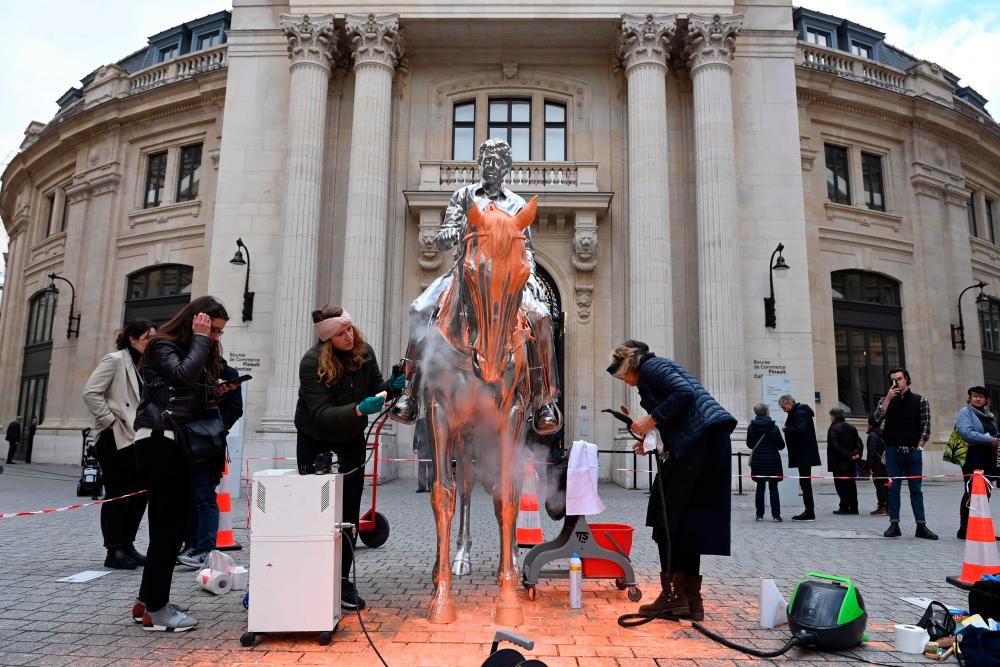EGYPT: UN climate talks were thrown into disarray Saturday as the EU rejected a proposal by host country Egypt for lacking ambition on emissions cuts and warned it would rather leave with no deal than a bad one.
Nearly 200 countries' representatives have gathered at the COP27 in Egypt for two weeks with the aim of driving forward action on climate change as the world faces a worsening onslaught of weather extremes.
But the talks have deadlocked over calls that wealthy polluters provide “loss and damage” funding for countries wracked by climate disasters, as well as over ambition in tackling global warming.
After negotiations stretched through the night following the last official day Friday, the European Union roundly rejected a draft document from Egypt.
European Commission Vice President Frans Timmermans said the EU would “rather have no result than a bad result” and was willing to walk out of the negotiations altogether.
But he added that the 27-nation bloc was still hoping for a good outcome.
The EU wants COP27 to have strong language on cutting emissions and to reaffirm the aspirational goal of limiting global warming to 1.5 degrees Celsius from pre-industrial levels.
“We are not here to produce papers, but to keep the 1.5C target alive,“ said German Foreign Minister Annalena Baerbock.
Egyptian Foreign Minister Sameh Shoukry, however, said he was still hopeful of a “breakthrough” and defended his proposal.
“The vast majority of the parties indicated to me they considered the text as balanced and that they constitute a potential breakthrough that can lead to consensus,“ he said.
'Unacceptable' for EU
Many developing countries see the creation of a loss and damage fund at this meeting as a defining issue of the talks.
The EU has put forward a proposal to create such a fund -- but has called for a broader set of donors and prioritising the most climate-vulnerable countries as recipients.
Timmermans said he was “worried” about the direction the negotiations took overnight.
He warned that if not enough is done to slash emissions and keep 1.5C alive, “there is no amount of money on this planet that will be able to address the misery that will occur through natural disasters, etc, that we’re already seeing,“ he said.
With around 1.2C of warming so far, the world has seen a cascade of climate-driven extremes in recent months -- from floods in Pakistan and Nigeria to heatwaves and droughts across the world.
An official from the French energy transition ministry told AFP that the proposal from the Egyptian presidency, which has not been published officially, sought to undermine gains in emission reductions made last year at the Glasgow climate talks.
“This is unacceptable for France and for European Union countries,“ she said, adding that the proposed decision text would remove an obligation of countries to regularly strengthen their national targets in order to meet the 1.5C goal.
Egypt criticised
Under the 2015 Paris Agreement, countries agreed to limit global warming to “well below” two degrees Celsius compared to the late 19th century.
They also signed on to an aspirational goal of capping the rise in temperature to 1.5C, which scientists subsequently confirmed was a far safer guardrail against catastrophic climate impacts.
This more ambitious 1.5C target was embraced last year in Glasgow, with countries agreeing to annually review their carbon reduction goals.
COP27 participants have criticised Egypt's handling of the talks, which have gone far into overtime with little sign of consensus on a daunting list of areas under contention.
The G77 and China bloc of 134 developing countries launched an opening gambit on loss and damage this week, with a proposal to create a fund at COP27, with operational details to be agreed later.
A compromise response from the EU, proposed late Thursday, suggested a fund specifically for the most vulnerable nations, saying the money should come from a “broad funder base” -- code for countries including China and Saudi Arabia that have become wealthier since they were listed as developing nations in 1992.
Britain and several other countries have circulated a new draft proposal document, seen by AFP and confirmed by a source close to the negotiations, which suggested the fund could be part of a range of “funding arrangements”.
Rich countries are also under pressure to finally fulfil promises to provide $100 billion a year to help developing countries green their economies and adapt to future impacts. - AFP









